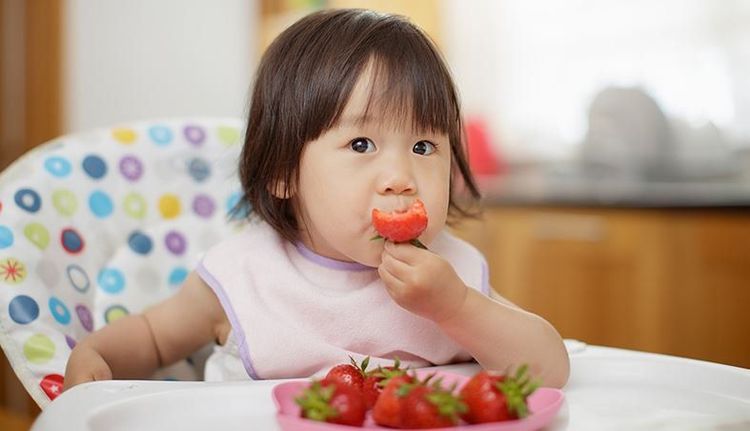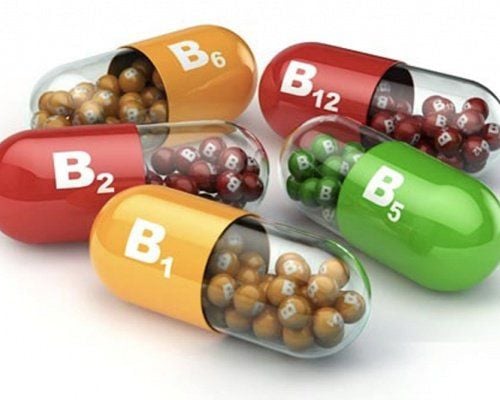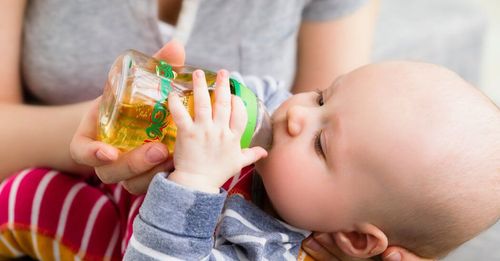This is an automatically translated article.
Should give your baby fruit instead of juice is recommended by the American Academy of Pediatrics, especially children under 1 year of age. You can give your baby fruit solids from 6 months of age, but avoid or limit the use of juice. So why should your baby eat fruit instead of juice?
1. Children should eat fruit instead of drinking fruit juice
According to the recommendations of the American Academy of Pediatrics (AAP), fruit juice should be given to babies instead of juice, especially for babies under 1 year old because fruit juice can be harmful to babies. In fact, fruit juice was once approved for use in infants and young children to supplement water and vitamin C. However, new studies show that fruit juice does not provide much nutritional value compared to eating fruit, and may even cause some harm to children, especially children under 1 year old. . Therefore, children should eat fruit.
1.1 For children under 1 year of age Absolutely do not give infants under 6 months of age fruit juice because it can cause babies to refuse breast milk or formula, as well as reduce the amount of protein, fat, vitamins and minerals that babies absorb from breast milk - the main source of nutrition for babies in the first 6 months of life.
Fruit juice does not bring nutritional benefits to children under 6 months of age, on the contrary, it can also increase the risk of infection due to chemical drugs, bacteria on fruits, affecting the immune system. child resistance.
It is advisable to give fruit instead of juice because for children under 1 year of age, excessive consumption of fruit juice can increase the risk of malnutrition and stunting.
Infants under 1 year of age may be allergic to some fruit juices due to the action of chemically irritating acids, such as orange juice.
1.2 For children over 1 year old In the composition of some fruit juices from oranges, grapefruits, apples, pomegranates, blueberries, ... contain flavonoids. This is a substance that has the ability to reduce the activity of important transport proteins as well as certain enzymes, leading to interactions with food or drugs.
Should give your baby fruit instead of juice because the high carbohydrate content in fruit juice may not be absorbed in the intestines, it will be fermented in the colon and cause diarrhea, abdominal pain, flatulence.
Fruit juices are high in sugar and calories, increasing the risk of tooth decay and weight gain.
Fruit juices do not provide enough fiber and nutritional value when compared to fruits, do not play an essential role in the daily diet to help children stay healthy and balanced.

Cha mẹ nên cho bé ăn trái cây thay vì uống nước ép trái cây
2. Notes when feeding your baby fruit and using age-appropriate juice
2.1 For children under 1 year old From 6 months old, you can give your baby fruit weaning by crushing or pureeing to supplement fiber, vitamins and minerals for the baby.
Fruit juices should not be used to rehydrate children with diarrhea.
Fruit juices may be indicated to relieve constipation in infants over 6 months of age. However, it is necessary to give fruit juice to children from a cup or spoon, avoid using bottles to reduce the risk of dental disease as well as not cause children to refuse breast milk or formula.
2.2 For babies over 1 year Children from 1 year old can use fruit juice, but should give children 100% fruit juice instead of prepackaged concentrate fruit juices .
Should give your baby fruit instead of juice to increase fiber directly to the body.
Children from 1 - 6 years old can drink from 120 - 180ml of fruit juice/day in snacks, do not use fruit juice instead of water or milk.
Children from 7 years old and above should only use a maximum of 280ml of fruit juice/day.
Giving your baby fruit has more benefits than drinking fruit juice because juice does not bring much nutrition compared to eating fruit directly.
In addition to nutrition, parents should supplement children with supporting products containing lysine, essential micro-minerals and vitamins such as zinc, chromium, selenium, and B vitamins to help fully meet nutritional needs. substances in children. At the same time, these essential vitamins also support digestion, enhance nutrient absorption, help improve anorexia, help children eat well, and develop comprehensively.
Please regularly visit Vinmec.com website and update useful information to take care of your baby and family.













